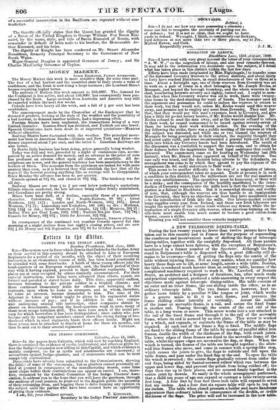MIGRATION OF LABOUR.
Blackburn Lane, 13th. August, 1860.
Sin--4 have read with very great interest the letter of your correspondent "A. W. W.," on the migration of labour, and also your remarks thereon. It may add to the information you desidemte upon the subject, if I detail what has taken place in this district within the last few days.
Efforts have been made (originated by Miss Nightingale,) to transfer some of the distressed Coventry weavers to the cotton districts and about thirty to forty have reached Blackburn, in small detachments of 'two or three at a time. About a fortnight ago, one of these weavers from Coventry was set to work on a pair of looms in a shed belonging to Mr. Joseph Eccles, at Moorgate, just beyond the borough boundary, awl the whole weavers in the shed, numbering between seventy and eighty, turned out. I ought to men- tion that when this Coventry weaver was set to work, there were twenty- nine looms in the shed standing for want of hands. The manager used all the argument and persuasion he could to induce the weavers to return to their work, but they would not, unless Mr. Eccles would send this weaver away, and promise not to employ any more from Coventry. They said fur- ther, that they would pay this man's expenses back to Coventry, and give him a little for pocket money besides, if Mr. Eccles would dismiss him. Mr. Eccles refused to send the man away, and as the weavers refused to return to their work, he caused summonses to be issued against seventy-seven of them for leaving their work without notice. On the evening of the day following the strike, there was a public meeting of the weavers at which the subject was discussed, and while one or two blamed the weavers of Moorgate for being precipitate in their conduct, the majority thought they had acted quite right, and some recommended ti general turn-out in all the Mills into which any Coventry hands had been introduced. The result of the discussion was a resolution to support the turn-outs, and to obtain for their defence before the magistrates the best legal assistance that could be procured. The summonses came on for hearing on Wednesday last (8th instant), when Mr. Ernest Jones appeared on behalf of the weavers. One case only was heard, and the decision being adverse to the defendants, an arrangement was come to by which they agreed to pay the expense of the summonses (3s. M. each) and return to dr& week. This seems to be another difficulty in the way of a migration of labour, of which your correspondent takes no account. Trade at present is in such a condition in this district, that the millowners are not the real masters of their own establishments. The operatives must be humoured, or there will be a strike; and the consequence of the hostility manifested to the intro- duction of Coventry weavers into the mills here is that the Coventry immi- gration is a failure in Blackburn. But it is somewhat strange, and worthy of note, that, although the weavers are thus hostile to an immigration from Coventry, they have no objection—at least they have manifested none —to the introduction of Irish into the mills. Our labour-market receives large supplies every year from Ireland, and these raw Irish labourers are taught the mysteries of the cotton trade without any demur, while the in- troduction of a single Coventry silk-weaver, whose previous 4wining on the silk-loom must enable him much sooner to become a good cotton-loom weaver, causes a strike. Trusting you will not consider these remarks inappropriate. E. W.


























 Previous page
Previous page